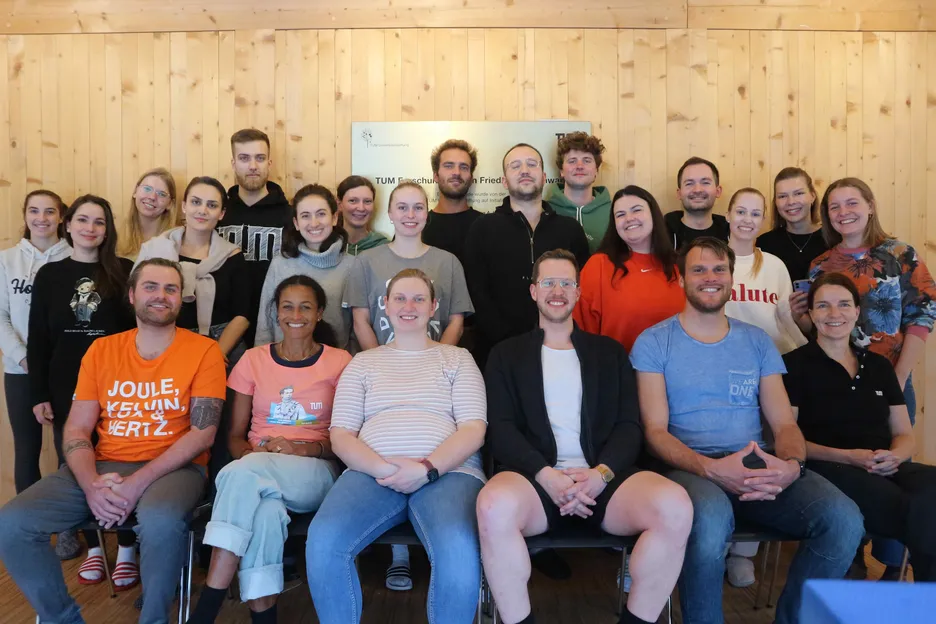Susanne Miesera, Carolina Olufemi and Verena Zehender win funding under the Excellence Strategy: Project-based teaching and learning on the topic of health promotion in the teaching of vocational schools

Teacher health in focus and promotion of teaching competence
Student teachers of vocational education work together for a week at the TUM Research Station Friedrich N. Schwarz to explore health promotion in school education.
The promotion of health knowledge and competence is considered a key topic for educational work in institutions of the education and training system (WHO, 2017; McDaid, 2016). However, only little importance is attached to the teaching of health topics. The Stada Health Report (2017) reports that only just under a quarter of respondents between 18 and 25 years of age learn about common diseases and their prevention or about the health care system at school. Bauer et al. (2018) come to the conclusion that health education in schools is deficient so far. Young people would like to see a subject of their own or a strong systematic integration of health topics in existing subjects (Bauer et al. 2018). The WHO aims for the European Region to promote health literacy in schools and education and recommends that health literacy be embedded in ongoing education (WHO, 2017). Wesselborg et al. (2014) show that in addition to teaching the scientific context of health, the topic of teacher health should be linked to other topics in teacher training in order to enable future teachers to constructively integrate health aspects as early as the planning stage of lessons. Future teachers reflect on the requirements of the profession from a health perspective, design health-promoting teaching situations and learn how to professionally teach, guide and control diverse learning processes. In this process, the teacher is an expert in methodological-didactic teaching processes in the field of health promotion. (Leisen, 2014).
In the broad subject area of health promotion, students develop an understanding of a healthy lifestyle with the help of diverse teaching and learning content in the areas of exercise, ergonomics and nutrition. The aim is to strengthen the teaching competence in order to independently develop teaching units for everyday school life. In order to expand their professional competence, they learn specific methodological-didactic interventions in order to convey an awareness of their own health (health literacy) to their future students.
Dr Susanne Miesera and Juliane Breitschopf win funding from the TUM teaching fund for the project "Research-based learning as part of the university school concept".
The training of prospective teachers is divided into a university phase and the preparatory service at schools. The professionalisation of future teachers is to be promoted during the phases with theoretical and practical components. The project "Research-based learning within the framework of the university school concept" consistently implements the interlinking of science and practice. For this purpose, the students conceptualise their own research projects at the university schools and implement them on site at a university school, thus dealing with teaching concepts in a differentiated manner. Research-based learning is the overarching guiding idea of the project. The aim here is for the students to develop a "basic research attitude" by participating in research at the university school. In the project, the students develop their own research questions with hypotheses and select appropriate research instruments. They conceptualise the research project and then implement it at the university school. The last step is the reflection in the form of an e-portfolio in which the research project as well as the research result is critically questioned.
The project goals are: - Stronger interlinking of science and practice - Promotion of the professional competence of prospective teachers - Linking of scientific research and teaching practice - Interdisciplinary cooperation between the university school and the university - Support for the cooperation of teachers and lecturers
Susanne Miesera and Dr Markus Gebhardt win funding from the TUM teaching fund for their project "Inclusive didactics in vocational schools, video-based case construction of inclusive teaching settings".
About the project: Teachers are increasingly confronted with heterogeneous classes at vocational schools. In addition to the diversity of educational qualifications and countries of origin, heterogeneity is also reflected in joint inclusive teaching with pupils with and without special educational needs. The planned course opens up a practical approach to inclusion through cooperation with an inclusive vocational school for special educational needs. The students analyse the inclusive teaching settings on site and develop subject-specific inclusive teaching situations on the basis of the analysed situations. They then recreate these situations in a team in order to be able to precisely identify characteristics for more or less inclusive teaching and to gain practical experience. The teaching project on inclusive didactics at vocational schools requires an interdisciplinary approach and is therefore developed and implemented in a team by Susanne Miesera (vocational school teacher training, subject didactics life science) and Dr. Markus Gebhardt (special education teacher training). The TUM Teaching Fund provides personnel funds to promote innovative teaching and examination concepts at TUM. These funds are to be spread as widely as possible in order to sustainably develop and improve teaching at TUM in many areas. The funds from the Quality Pact for Teaching are thus made directly available to committed teaching staff and offer space for trying out new formats and ideas. Successfully mastering heterogeneity in teaching